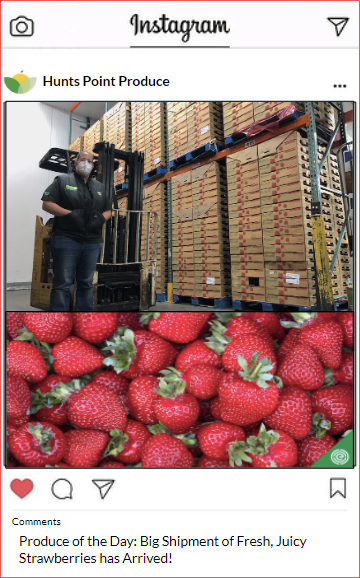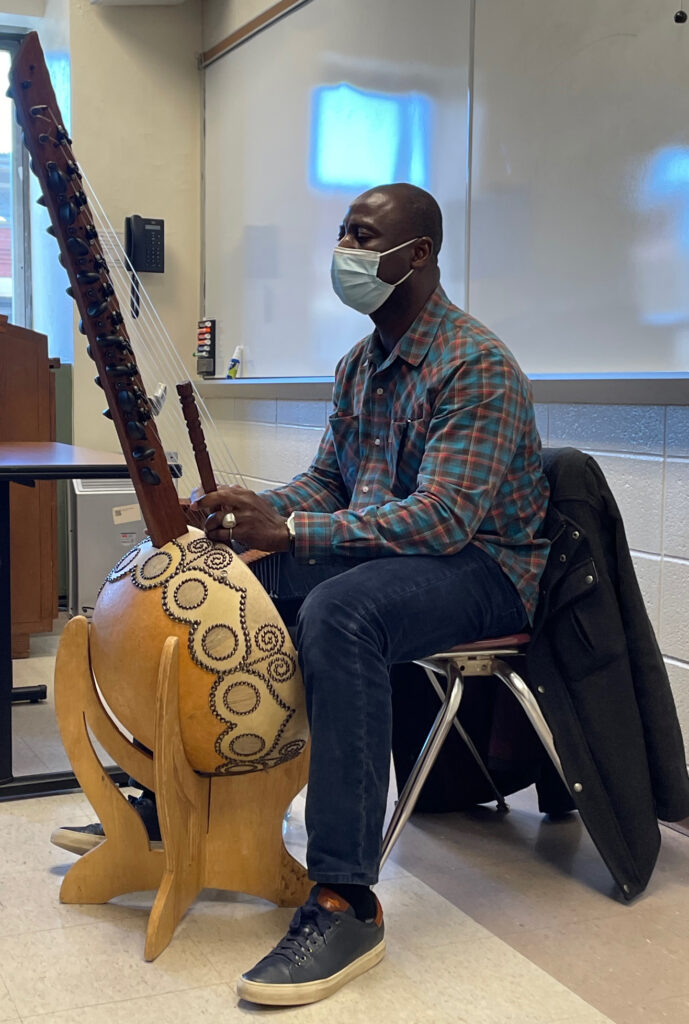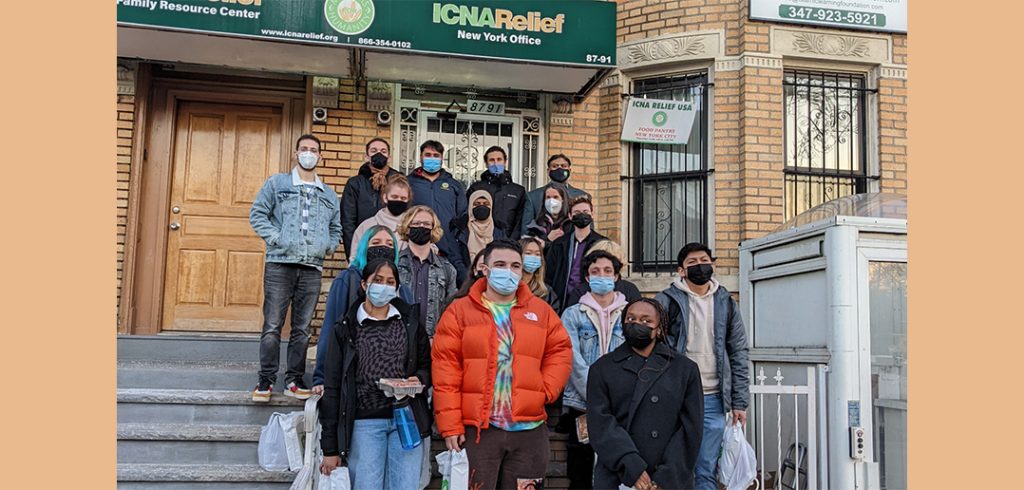In a music class, students learned about world music and dance from Bronx performers who also educated them about cultures from Cuba, West Africa, and elsewhere.
And, in a theology class, students gained new insight into scriptural themes by working with a local Muslim relief organization helping the hungry and the displaced.
These are some of the classes that formed connections beyond campus this year with the help of Fordham’s Center for Community Engaged Learning, which brings professors and students together with the University’s neighbors for projects related to equity and societal progress.
Such courses are a priority of the University’s $350 million fundraising campaign, Cura Personalis | For Every Fordham Student, because of how they advance students’ learning and development. While a student may understand their course lessons in the abstract, “when they have to apply their learning, it lights something else up for them; it gets them excited in a different way about what they are doing,” said the center’s director, Julie Gafney, Ph.D.
With the continuing development of new courses across the arts and sciences that let students delve deeply into questions involving the wider community, she said, “this work can really foreground so much of what Fordham is about.”
Six years ago, there were just seven community engaged learning courses at Fordham. This year, they number more than 80. Fueling that growth—essential to it, in fact—are donations from alumni, many of whom see an opportunity to advance the University’s mission of social justice and service to humanity.
Philanthropic Support
One major contributor to the center, Fordham Trustee Gualberto Rodriguez, FCRH ’95, has most recently given in support of a community engaged learning project at Mott Hall High School in the Bronx. His gift is funding a new facility in which students can learn about gaming, computer science, coding, and related topics in a creative environment, working with Fordham student mentors and University professors and administrators.
He was proud to see that Fordham had come up with this idea to leverage its technology expertise to empower others, “so my wife and I were delighted to support that,” he said.
“For me, the center is so crucial to Fordham’s purpose and mission,” because of its social impact but also its benefits for students, he said.
“As you get exposed to the opportunities to serve, you’re actually getting served and transforming your perspective in ways that are an invaluable gift,” said Rodriguez, chairman and CEO of the investment management firm Grupo Navis. “There is no substitute for stepping out and seeing how you may be of service and how others support you, [including people]you may think have less than you and in fact are quite resourceful. It just transforms perspectives and informs the judgment of future leaders.”
The center’s expenses include honorariums for guest speakers, stipends for faculty members who are in training to teach community engaged learning courses, and transportation costs for students, Gafney said. The center’s goal is for every Fordham student to be able to take at least one community engaged learning course, which would require offering approximately 250 of them per year, she said.
Another supporter, Allison Farina, FCRH ’93, LAW ’99, an attorney and longtime supporter of the center, said it sets Fordham apart from other New York colleges and universities. Its mission resonates with her because of her various service work over the years, and the ways in which service can become “part of the fabric of who you are,” said Farina, a former Fordham University Alumni Association board member.
One of her first service experiences was visiting retired professor Andrew Varga, S.J., now deceased, at Murray-Weigel Hall as part of the Adopt-a-Jesuit program during her student days—an experience that was beneficial to him but also interesting to her, because of his vast knowledge.
While Fordham’s picturesque Rose Hill campus draws students to the University, she said, Fordham’s Jesuit education, ironically, conveys the opposite message—to look outward from campus and “use your talents and energy and care about who and what lies outside—in the neighborhood.”
“The Center for Community Engaged Learning is the heart and engine of this at Fordham,” she said.
Tackling Food Waste
In a consumer behavior class taught by Genevieve O’Connor, Ph.D., at the Gabelli School of Business, that meant working with Hunts Point Produce Market in the Bronx, devising plans for marketing more of its fruits and vegetables to local bodegas to cut down on the amount that winds up wasted.

Michael Bernard, a junior at Gabelli, said the project showed him how the market is part of a huge network of nonprofits involved in feeding millions of hungry people in the in the city and in the tristate area. Working with members of the community is an “extremely valuable” character-building experience for students, he said.
Another student, Nolan Aloia, said such projects are “much more interesting” than hypothetical scenarios. “It just feels a lot better, as a student, actually being involved more in the community,” said Aloia, a Fordham College at Rose Hill junior minoring in marketing.
O’Connor, an associate professor of marketing, said she’s found that such applied learning is a powerful mechanism for conveying concepts in real-world scenarios.
“This is just a tremendous opportunity for our students, but also for our faculty, to be able to see how our work can make a positive impact on society, and especially our community members,” she said. “If we have the tools and the resources and we’re able to offer help in a meaningful way, I think that excites the students and gets them energized.”
Learning About World Cultures
For her world music and dance class, Angelina Tallaj, Ph.D., assistant professor of music, invited musicians from the Bronx into class to help students better understand world cultures represented in the Bronx. A man originally from West Africa who is a griot—or traveling storyteller and musician—spoke about the importance of this role and how it has changed. A Cuban priest demonstrated his country’s intricate musical drumming traditions and dispelled some misconceptions about Santeria, the Afro-Caribbean religion of Cuba.

An Afro-Puerto Rican drummer visited the class and spoke about her challenges with learning and performing traditional Afro-Caribbean music, given that in her culture, women are not supposed to be performers.
“We do readings, we discuss things, but I think when they learn straight from somebody from the culture, it’s so much better,” Tallaj said. “I try to be very intentional about who I bring—maybe artists that challenge students’ traditional views, or norms or identities.”
As with all community engaged learning courses, students write essays about how they’ve been changed by the class—by learning to be a more engaged citizen, perhaps, or by losing preconceived notions.
With pandemic-related restrictions easing, Tallaj hopes to take students to Bronx venues to learn more about others’ musical cultures. “It has been very interesting to me to see how students really want to go into their communities,” she said.
Living Theology
In an honors theology course that compares Jewish, Christian, and Muslim scripture, students worked with the Queens-based relief arm of the Islamic Council of North America, volunteering with food distribution or other tasks, said the instructor, Kathryn Kueny, Ph.D., professor of theology.
The students also co-organized an April 26 event at the Lincoln Center campus centered on the iftar, or Muslims’ post-sunset meal that breaks their daily fast during the holy month of Ramadan, and the class hosted a Muslim chaplain and a community organizer as well.
In class discussions of scripture, Kueny said, “we’re trying to draw on some themes that connect with our community partners,” such as community displacement—what it feels like and how faith communities have responded to it. In the students’ essays, she said, “you could really see that they were tying things together.”
Teaching a community engaged learning course meets one of her longstanding interests as an educator.
“I’ve always been really intrigued with the idea of thinking about how students can see religion, or the study of religion, in a different way, or think about a lot of these theological topics in more lived, experiential ways,” she said. “What does it feel like to be really hungry and desperate, or what does it feel like to have someone help you in your most desperate times? We read about those things and we’re almost numb to them, I think.”
The students’ community-based work not only helps students appreciate these experiences but also provides a much-needed salve to the isolation that came with the pandemic, she said.
“We’ve all been online and Zooming and missing out on those human encounters,” she said. “So the opportunity to engage with local communities has really gotten people back out there and makes them feel more connected.”
To inquire about giving in support of the Center for Community Engaged Learning or another area of the University, please contact Michael Boyd, senior associate vice president for development and university relations, at 212-636-6525 or [email protected]. Learn more about Cura Personalis | For Every Fordham Student, our campaign to reinvest in every aspect of the Fordham student experience.


